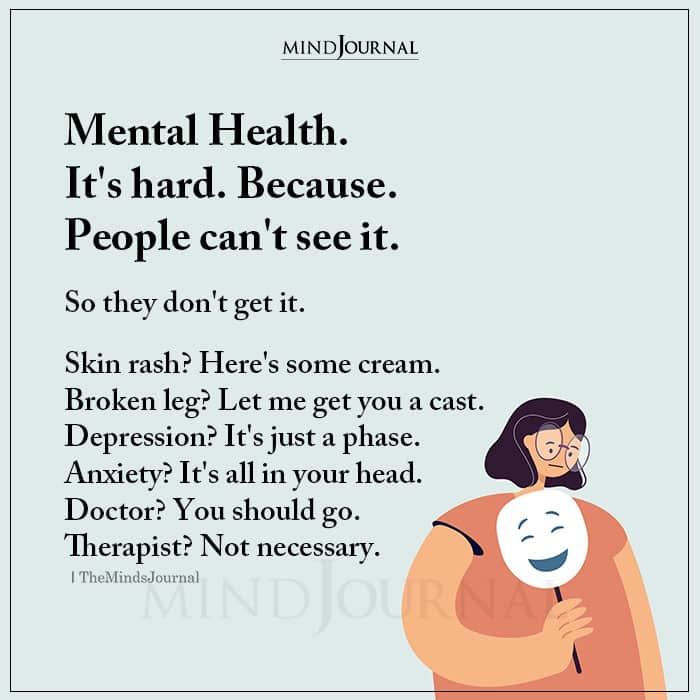Ever sat by yourself and wondered if you are living just for the sake of it? Or asked yourself, “Am I just surviving?” You may feel your life is falling apart or just coming to a halt. Think again, is it your life or your mental health? Here’re the common warning signs your mental health is declining and it needs to be addressed.

We are repeatedly making the unforgivable mistake of compromising our mental well-being at the cost of living a better life. Ever wondered, how degraded your mental health would be, 3 years from now on? Okay. Let’s consider 5 years from now. Maybe 10 years?
You would be dehumanized to the point of exhaustion yet seek a better life, better technology, better infrastructure, and more financial and social security. How many of us would even notice our descending mental health? Even if we accidentally did, would we care? Nah!
With so much being said, mental health problems are the world’s leading cause of death. Welcome to the cruel reality. But how to know if your mental health is declining?

Here are some facts about the growing monster nicknamed ‘mental disorders’:
- The lifespan of people with severe mental disorders is shorter compared to the general population (severe mental disorders refer to psychosis, bipolar mood disorder, and moderate-severe depression). (1)
- People with depression have a 1.8 times higher risk of dying due to suicide. Due to the rigid stigma around mental health issues, people with mental problems receive lesser physical health care as compared to the general population.
- The mortality rate of people with bipolar mood disorders ranges from 35% higher to twice as high as the general population.
- There is a 10-25 year life expectancy reduction in patients with severe mental disorders.
Looking at the statistics, it’s easily understandable that mental health is gradually making its place on the list of the world’s leading causes of death. Now the big question is, are you taking good care of your mental health? You are likely not.
5 crucial signs your mental health is declining
If you notice these 5 signs in you, your mental health might be trying to signal you something really serious. These are the signs your mental health is falling apart and need to be put together:
1. Disturbances in sleep patterns
Sleep problem is one of the major warning signs of mental illness. Sleep disturbances are often a symptom of more serious mental illnesses. Changes in patterns of sleep often are a cause of mental disorders.

Many mental disorders have sleep disorders as comorbid symptoms. On an estimated scale, 40% of insomnia patients and over 45% of hypersomnia patients have a psychiatric condition.
Many people with degraded mental health report that the sleep they have are not restorative in nature – they do not wake up feeling fresh and energetic. They either find it difficult to fall asleep, get fragmented sleep, or wake up too early. Either way, they get up tired and groggy.
Sleep disturbances indicate that there have been significant changes in brain chemistry. These people spend more time being in the light stages of sleep rather than the deeper and urgently important stage of REM sleep. If you are not being able to get proper sleep even after trying, you need to review your mental health.
Read 5 Tell-Tale Signs You’re in Need of a Mental Health Check-up
2. Having frequent nightmares
Occasional nightmares are normal and nothing to be worried about unless it’s interfering with your sleep routines. Frequent, repeated nightmares are a loud sign that your mental health is falling apart and in need of attention.

Sally Baker tells Metro.co.uk how nightmares could be a sign of something troubling underneath the surface. She says, ‘Dreams and nightmares are one of the ways the subconscious mind processes emotional challenges, so recurring nightmares can be a clue that your mind is struggling to cope with real-life negative emotions or events.
The nightmares may even vary with different narratives but if they engender the same feelings on waking from them such as heightened anxiety or feeling of dread you are definitely struggling to process.’
3. Changes in eating patterns
A study indicated that it is important to recognize that the associations between eating patterns and mental health problems may be bidirectional, as mental health problems may promote unhealthy eating.

Dr. Kousoulis says, “Mental health problems often have an impact on appetite; it’s important to note how dramatic or persistent the changes are.”
In depression, it is natural for people to have a reduced appetite. While some people also engage in emotional eating. Sometimes feeling like guzzling food (especially if you are a foodie) or having absolutely no wish to eat after a stressful day is natural. But if you notice a persistent and noticeable change in your feeding pattern you might be running a higher risk of having mental disorders.
4. Changes in libido
Dr. Andy Zamar, founder of the London Psychiatry Centre and creator of the Prolong Device and Control Training Program says, “Everything in our body is connected, and this extends to sex.”
Our brain is indeed our sex organ. “Our brain’s neurotransmitters and neural/nerve pathways tell our sexual organs we are interested,” says Dr. Mindy Beth Lipson, a psychologist. So, if something is not quite right in the upper compartment, it is the least likely for your libido to function normally.
For instance, one study found that more than 70 percent of depressed patients had a loss of sexual interest when not being under medication. They also reported that the severity of this loss of interest was worse than the other symptoms of depression. Similarly, many studies have associated an increase in one’s libido with the mania phase of Bipolar Disorder.
5. Social withdrawal or limited social contact
Loneliness, besides depression, is one of the biggest concerns of the millennial. Social withdrawal and lack of interest in making meaningful social contacts are a symptom of a number of mental health issues, Depression, social anxiety, performance anxiety being some of them.

Depression is one of the mental disorders that have social withdrawal as one of its main symptoms. Stephen Ilardi, Ph.D., author of books including The Depression Cure and associate professor of psychology at the University of Kansas says, “When we’re clinically depressed, there’s a very strong urge to pull away from others and to shut down.”
Quite naturally, withdrawing oneself from social contacts can also lead one to be pushed to loneliness. Generally, a person would like to seek social approval and connection, but if you usually lack the urge to talk, share and connect to even your family members or other close people, you might require to review your mental health.
Read Quick Ways to De-Stress and Improve Mental Health
Half of the concern is identifying the signs of deteriorating mental health. The real struggle starts when you have to make amendments to your lifestyle, compromise your daily schedule to begin living a wholesome life. You have still got time to mend your mental health. It’s never too late to realize.
Frequently Asked Questions (FAQs)
What causes mental health decline?
Childhood abuse, trauma, loneliness, and low self-esteem are some of the major signs mental health is declining.
Why is mental health not taken seriously?
There is a lack of awareness about mental health. People find it difficult to talk about their mental health issues because of the fear of neglect and judgment. The societal perspective on mental health issues is distorted and that is why people hide their mental health problems for not to become the subject of shame.
What happens when mental health goes untreated?
An untreated mental illness can become severe and lead to various issues, such as physical illness. A gradual decline in mental health, if untreated, can make your day-to-day life unstable.












Leave a Reply